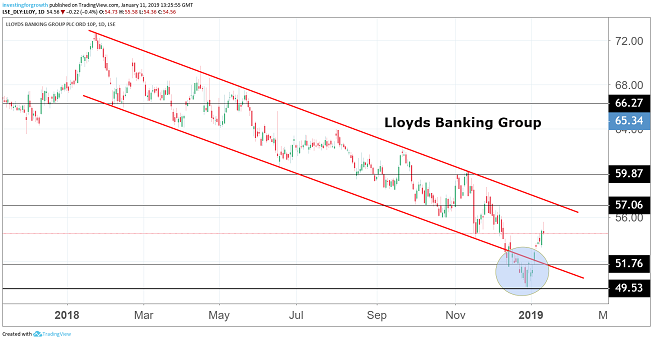Lloyds Banking Group shares downgraded, but should you still buy?
11th January 2019 13:38
by Lee Wild from interactive investor
Lloyds Bank shares are outperforming the wider market in 2019, but another City expert has tweaked forecasts. Lee Wild runs through the major changes investors should be aware of.

The UK's most widely-owned share continues to divide opinion in the City. Our technical analysts have long predicted the downtrend in the Lloyds Banking Group (LSE:LLOY) share price, and this week we reported on how one respected sector analyst tipped the bank to bounce bank. Time for the bears to fight back.
To recap, UBS analyst Jason Napier said this week: "With earnings estimates reasonably firm over this period the UK domestic banks in particular look to have de-rated substantially on political and macro concerns which we expect to ease". He still thinks Lloyds shares are worth 80p.
However, as part of a note on the best European banks to buy in 2019, a highly-experienced team of sector analysts at Deutsche Bank has today cut back its price target for Lloyds by almost 12%, down from 77p to 68p. Lloyds didn't make the list.
To be fair, not one UK domestic lender made Deutsche Bank's top 10, but the broker still rates all three a 'buy' in the following order: Barclays (LSE:BARC), RBS (LSE:RBS) and then Lloyds.

Source: TradingView (*) Past performance is not a guide to future performance
Brexit uncertainty is clearly a worry for Deutsche's number crunchers, so much so that they've increased the cost of equity (CoE) for UK domestic banks by 1%, which means its valuation methodology now uses 10.5% for Barclays and RBS, and 10% for Lloyds.
Deutsche has also reduced price/earnings (PE) multiples used to price up the banks, down to a modest 7 times for UK retail and 8 times earnings for commercial.
It talks about three themes for the sector in 2019. A soft Brexit would trigger a rally among local lenders, although its forecasts still assume rising impairments and low levels of loan growth for all three banks given uncertainty around the outcome.
Margins will remain a feature following a deterioration during the third quarter. Despite pricing holding up during the final three months of last year, Deutsche thinks pressure will "remain into 2019 driven by competition and higher liquidity balances".
Thirdly, capital returns could see a "material step up" over the next 12 months. Lloyds is tipped to announce a £1.5 billion buyback at its full-year 2018 results, RBS is expected to do something similar through 2019 – if Brexit delays the sale of the government’s stake, a special dividend becomes more likely - and Barclays is said to be readying a £0.5 billion buyback to coincide with first-half results.
Here are the key changes to Deutsche Bank's forecasts:
Lloyds Banking Group – price target 68p (currently 54.66p)
Adjusted earnings per share (EPS) estimates for 2018 are trimmed by 3% to £5.539 billion, by 6% in 2019 to £5.277 billion, and 4% in 2020 to £5.498 billion.
"This is primarily driven by higher remediation cost assumptions, higher loan loss assumptions, and higher minority charges," explain the analysts. "Given lower earnings, lower PE multiple assumptions in our [sum of the parts valuation] and a higher CoE our target price (TP) falls from 77p to 68p. With 26% upside we retain our ‘buy’ rating. Each 1% higher CoE lowers our TP by c.5p."
Royal Bank of Scotland – price target 276p (currently 226p)
Adjusted earnings increase by between 1% and 3% between 2019 and 2021, as lower preference share costs offset underlying downgrades to income. However, higher CoE assumptions and lower PE multiples triggers the downgrade to price target from 300p previously. Each 1% increase in CoE is about 19p off the price target.
Barclays – price target 207p (currently 157p)
Lower forecast income at the investment bank drives a decline in earnings estimates of 1-4% over the forecast period, giving a return on tangible equity of 9% versus a target of over 9%. As well as the predicted £0.5 billion share buyback, Deutsche pencils in capital returns of about £6 billion over 2019-2021.
A drop in price target from 243p previously is triggered by lower earnings, higher CoE and lower PE multiples. Each 100 basis-point increase in the CoE is 13p off the share price, according to Deutsche.
*Horizontal lines on charts represent levels of previous technical support and resistance. Trendlines are marked in red.
Full performance can be found on the company or index summary page on the interactive investor website. Simply click on the company's or index name highlighted in the article.
These articles are provided for information purposes only. Occasionally, an opinion about whether to buy or sell a specific investment may be provided by third parties. The content is not intended to be a personal recommendation to buy or sell any financial instrument or product, or to adopt any investment strategy as it is not provided based on an assessment of your investing knowledge and experience, your financial situation or your investment objectives. The value of your investments, and the income derived from them, may go down as well as up. You may not get back all the money that you invest. The investments referred to in this article may not be suitable for all investors, and if in doubt, an investor should seek advice from a qualified investment adviser.
Full performance can be found on the company or index summary page on the interactive investor website. Simply click on the company's or index name highlighted in the article.